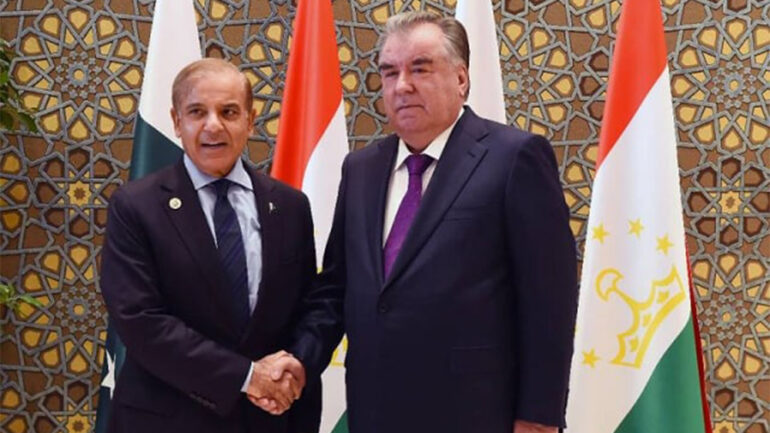Releasing a joint communiqué after a meeting in Islamabad on Wednesday, Pakistan’s Prime Minister Shahbaz Sharif and President of Tajikistan Emomali Rahmon have noticed the establishment of an “inclusive government” in Afghanistan. The two leaders also stressed on completion of the CASA-100 power project.
The joint communique issued late on Wednesday, December 14, noted that the two sides have agreed that a peaceful, prosperous, interconnected, and stable Afghanistan is fundamental to regional prosperity and progress.
“They considered it important for Afghanistan to have an inclusive government,” part of the joint communique released by the office of the two leaders stated.
Appearing in a joint press conference with Pakistan’s PM, Tajik President said that they also discussed the Afghanistan issue in their meeting. “We are most of all and vitally interested in the restoration of lasting peace, enduring stability, and national reconciliation in full-ravaged Afghanistan,” Emomali Rahmon said at the conference.
“We, in this respect, notice the establishment of an inclusive government in Afghanistan where different political and ethnic groups are widely present,” he added.
The establishment of an inclusive government is said to be one of the conditions for the recognition of the Taliban government.
More than a year into reigning, the group, however, has failed to meet conditions, including the establishment of an inclusive government, for international recognition.
The Taliban’s current de facto regime is formed mostly by members of the Pashtun-dominated group. Still, the group has taken a defensive stance against international demands claiming that their government is inclusive.
Moreover, Pakistan’s PM and Tajikistan President stressed on implementation of the CASA-1000 project as soon as possible.
CASA-1000 is an ambitious renewable energy infrastructure construction project that will facilitate the export of hydroelectricity from Kyrgyzstan and Tajikistan to Afghanistan and Pakistan.
Completion of the project, as the two leaders agreed, would open new avenues for future energy corridors that will lead to prosperity for the whole region.




